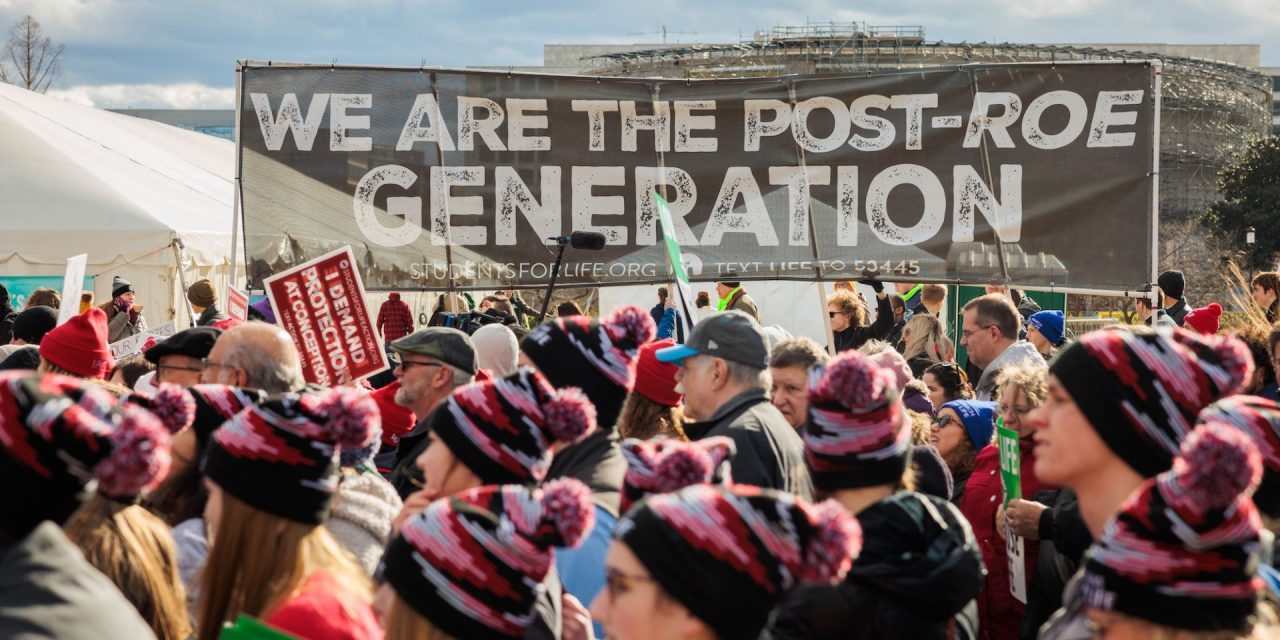Thousands participated in the 2023 March for Life Jan. 20, 2023. Photos by Eric Brown
WASHINGTON (BP)—Thousands of pro-life Americans gathered Friday, Jan. 20, for the 50th annual March for Life to rejoice in a long-sought victory and to restate their commitment to protect preborn children and care for their mothers.
 Initiated in 1974, the latest March for Life was the first to be held since the U.S. Supreme Court overruled in June of last year the Roe v. Wade decision. That 1973 ruling legalized abortion nationwide, ultimately resulting in the deaths of more than 60 million preborn children and prompted the launch of the pro-life march a year later. The high court’s June ruling returned abortion regulation to the states.
Initiated in 1974, the latest March for Life was the first to be held since the U.S. Supreme Court overruled in June of last year the Roe v. Wade decision. That 1973 ruling legalized abortion nationwide, ultimately resulting in the deaths of more than 60 million preborn children and prompted the launch of the pro-life march a year later. The high court’s June ruling returned abortion regulation to the states.
 Brent Leatherwood, president of the Southern Baptist Ethics & Religious Liberty Commission, and other staff members participated in the march and the rally that preceded it on the National Mall in Washington, D.C.
Brent Leatherwood, president of the Southern Baptist Ethics & Religious Liberty Commission, and other staff members participated in the march and the rally that preceded it on the National Mall in Washington, D.C.
“This year’s March for Life is one of both celebration and resolve,” Leatherwood said in written comments for Baptist Press. “It is an extraordinary reality that at what we thought would be the 50-year mark of the disastrous Roe decision, we are gathered here today in a post-Roe world.
 “It is right and good to take a moment to celebrate that our nation has taken this first step towards protecting life,” he said. “But we know that more work remains.
“It is right and good to take a moment to celebrate that our nation has taken this first step towards protecting life,” he said. “But we know that more work remains.
“We will press on towards a day when both mothers and their children are fully valued as image-bearers of God. We are committed to establishing a true culture of life by developing innovative solutions and policies that actually serve mothers and help families flourish, and we will march until abortion is no more.”
The march came two days before Sanctity of Human Life Sunday and the actual date of the Roe opinion, Jan. 22. It will be the 38th year for the observance on the Southern Baptist Convention calendar, one many Southern Baptist churches commemorate.
In celebrating Roe’s reversal, March for Life President Jeanne Mancini expressed gratitude at Friday’s rally to the marchers and to longtime pro-life advocates, including the late Nellie Gray, the march’s founder. After Roe was reversed, the March for Life staff was often asked if the event would continue, Mancini said.
“(W)hile the march began as a response to Roe, we don’t end as a response to Roe being overturned,” said Mancini, March for Life’s president. “Why? Because we’re not yet done.
“While this year marks our most significant victory, the human rights abuse of abortion is far from over” she said. “We will continue to march until the human rights abuse of abortion is a thing of the past. We will march until abortion is unthinkable. “
The theme of this year’s march was “Next Steps: Marching Into a Post-Roe America.” Speakers addressed the future efforts of the pro-life movement, including through legislation, adoption and maternity homes.
Mississippi Attorney General Lynn Fitch, whose defense of the state’s ban on abortion after 15 weeks’ gestation led to Roe’s reversal, rejoiced in the Supreme Court decision and said, “But this is not the end of our journey.
“Until we can give women when they are most vulnerable what they need and what their children need to thrive, and until we can make changes in our laws that reflect our compassion for all life and until we can change hearts and minds in our fellow Americans, until then, life remains fragile and the embrace of human dignity remains aspirational,” she said at the rally.
Standing with other members of the U.S. House of Representatives, Rep. Chris Smith, R-N.J., said he attended the first March for Life as the leader of a college pro-life organization.
“Countless times we chanted the slogan, ‘Hey, hey, ho, ho, Roe versus Wade has got to go,’ and today we celebrate – Roe is gone,” he told the crowd.
“The United States and the world must recognize the breathtaking miracle of the newly created life of an unborn child and that women deserve better than abortion,” Smith said. “We need to care for them both.”
The House is expected to vote soon on his legislation, the No Taxpayer Funding for Abortion Act, Smith said. The legislation would bar federal funding of abortion.
The March for Life changed its route this year in acknowledgement of the post-Roe, political reality. Instead of marching straight to the Supreme Court building, participants passed the Capitol on the House side on the way in recognizing Congress’ important role of regulating abortion at the federal level.
Rep. Trenee’ McGee—an African-American Democrat in the Connecticut legislature—commended black pro-life women and said of what she described as the “systematically racist abortion industry.”
“You’ve mocked impoverished communities all while putting clinics in them. You’ve told me I can’t be black and pro-life because black women need abortion more than anyone.”
Former National Football League coach Tony Dungy and his wife Lauren encouraged the crowd to continue in the pro-life cause. The Dungys have 11 children, eight by adoption.
As an adoptive mother, Lauren Dungy said she is “so grateful for these birth moms who chose life rather than abortion. They’ll never know what a blessing it is to have these children in our life.”
In the post-Roe era, “we have to pray that we will have enough adoptive families to care for these precious lives,” she said.
Jonathan Roumie, the actor who portrays Jesus in the television series “The Chosen,” said at the rally, “History has been made. Life has triumphed in a miraculous way.”
After reading from Psalm 139 about David’s testimony of God’s sovereign care for him in the womb, Roumie said, “Having lived under a grim cloud of darkness for the last 50 years, the world has once again been given a glimmer of hope. And I pray that with this recent step in protecting life, despite the grievous nature of what we’ve allowed, that God might still look upon us in His infinite mercy and see the hearts of those of us here in support of life today and say to us in this hour, ‘It is good.’ And it is good, but it is far from finished.”
In the closing prayer, evangelist and Samaritan’s Purse President Franklin Graham prayed “for the millions of women who feel that they have no hope, that they’re condemned because they had an abortion. Father, my prayer is for these millions of women that they will come to know that You love them and care for them and that You will forgive them of their sin if they would repent and believe on the name of Your Son, Jesus Christ.”
March for Life intends to expand the number of marches in states, Mancini told the crowd. Marches will be held in 10 states this year, and the plan is to hold marches in all 50 states in the next five to seven years, she said.





